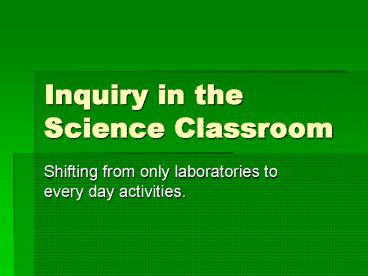Inquiry in the Science Classroom - PowerPoint PPT Presentation
1 / 20
Title:
Inquiry in the Science Classroom
Description:
Ranges from student driven to teacher guided ... 'Welcome to the Weather Underground.' 2006. The Weather Underground, Inc.. 07 Apr. 2006 http://www.wunderground.com ... – PowerPoint PPT presentation
Number of Views:103
Avg rating:3.0/5.0
Title: Inquiry in the Science Classroom
1
Inquiry in the Science Classroom
- Shifting from only laboratories to every day
activities.
2
Traditional Inquiry
- Used usually in laboratory experiences
- Ranges from student driven to teacher guided
- Engages students in the investigative nature of
science
3
Pros Cons of Traditional Inquiry
- Pros
- Best simulates actual scientific processes and
methodologies - Develops deeper thinking skills in students
- Overall greater learning experience for students
- Cons
- Can decrease content coverage
- Difficult to assess using traditional methods
- Equipment and time restraints
- Students may lack sufficient knowledge to be
successful
4
Inquiry Cycle
5
Todays Thoughts on Inquiry
- Involves collection and interpretation of
information in response to wondering and
exploring. - Does not necessitate laboratory experiences.
- Data driven decision making.
- Students investigate the why.
- Lesson structure determines inquiry level.
6
Different Purposes of Inquiry
- To illustrate a concept
- To stimulate discussion/critical thinking
- To investigate the cause or effect of an event or
event(s) - To look at the what if
- To increase the scientific and intellectual
curiosity of students
7
Modes of Inquiry
- Pencil/paper activities
- Videos
- Internet
- Hands on activities
- Laboratories
8
Man Without a Stomach Video
- Why does Jonas have to go to the bathroom a few
minutes after eating? - Why is Jonas so thin?
- Why didnt the bleach damage Jonas pancreas and
liver? What if it had? What consequences would he
have faced? - Design a diet for Jonas based on his current
injuries. Be sure to explain your rationale
behind your recommendations.
9
What patterns do you see?
10
How do you explain these patterns?
11
How could we test our possible explanations
(hypotheses)?
12
How might latitude influence fall color change?
13
Cities at higher latitudes should be cooler
during the fall? Cooler temps later fall leaf
color change?
Traverse City, MI
Grove City, OH
Columbia, TN
14
Where can we get data?
- "Welcome to the Weather Underground." 2006. The
Weather Underground, Inc.. 07 Apr. 2006
http//www.wunderground.com/.
15
(No Transcript)
16
OUR CONCLUSION IS SUPPORTED!
17
OUR CONCLUSION WAS CORRECT!!!!!
BUT WAIT
18
Light is also highly correlated!!!!!
19
Is there a difference in the amount of light at
different latitudes?
20
Online Inquiry Experiences
- www.accessexcellence.com
- Croak
- http//www.accessexcellence.org/AE/mspot/croak/ind
ex.htm - Angry Red Planet
- http//www.accessexcellence.org/AE/mspot/arp/index
.htm































